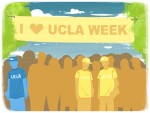I love 8-clapping as much as the next person, but school spirit can only get you so far.
This week marks the sixth rendition of I Heart UCLA Week put on by the Student Alumni Association, and recognizing the limits of school pride is a lesson SAA can take to heart. The goal of the week’s events is to remind students of all the different activities and groups that make UCLA great. These events include Bruins Week Out in Westwood, performances by cultural groups, Thank UCLA Day where students can donate to a program of their choosing and Seniors Night Out.
But even in the midst of these events, it’s important to remember that not all students buy into the message. I Heart UCLA Week is presented by organizers as apolitical, neutral and full of school spirit. This neutrality, however, can be harmful because it presents the collective UCLA identity as something that applies to all of the student body. But there are communities on campus that don’t feel included in that collective identity, and ignoring their sentiments during this week reduces its effectiveness in bringing the student body together.
Just looking back at events from the last year makes it apparent that forging a single collective identity is impossible. During fall quarter, former Undergraduate Students Association Council President Devin Murphy resigned early from his post and said in a Facebook statement, “This institution and all others like it around the country were not made for people like me.” Explicit in this statement was Murphy’s sentiment that there are structural problems within the university that makes UCLA as an institution hostile toward underrepresented groups, which students and administrators are responsible to change.
Additionally, two weeks ago, stickers were posted outside of the Afrikan Student Union which mocked the death of Freddie Gray. The chairperson for the ASU responded to hateful stickers by saying that it is a reminder UCLA has failed to create an environment where underrepresented students can “feel accepted, valued, welcomed and most importantly humanized on this campus.”
Despite the way this created hostility for a community on campus, it took the school far too long to respond, demonstrating a lack of awareness for how the incident affected students.
In both these instances, the response from students is very clear – there are barriers within the university that place some students outside of the collective student body that I Heart UCLA Week targets.
Of course, these problems won’t go away immediately. Problems of inclusion and discrimination are endemic to any community. But trying to lump the student body under one identity isn’t the best way of generating support for the university.
One way to start reforming I Heart UCLA Week is to use it as a week to discuss student issues. One part of loving our school is criticizing it in order to improve it. School spirit does not have to come at the cost of political silence.
If you look at the events of the week, they all contain that ra-ra, go-team feel of a high school pep rally. To be sure, the week already has a lot to offer – cultural events, Spring Sing and Alumni Day are all important events for the campus. But celebrating the school does not have to be completely separate from activism that creates an inclusive campus.
In particular, I Heart UCLA Week could partner with student activist organizations to lobby for state funding. Of course student activism happens at other times, but I Heart UCLA Week has the ability to turn student and alumni focus on activism. Additionally, I Heart UCLA Week could even partner with ASU to create a formal student disapproval of the stickers posted outside its office. Incorporating a rally or public display of disapproval into the events of I Heart UCLA Week would show that the student voice condemns what happened.
The status quo approach to the week does exactly the opposite. SAA Bruin Spirit Committee Executive Director Tanner Pattee said I Heart UCLA Week does not promote a particular political agenda and tries to remain neutral on campus controversies. The goal, he said, is to remind students of all of the opportunities that UCLA gives students.
I don’t disagree with Pattee and I don’t think celebrating UCLA is bad. The point is that if we want to build solidarity among students to remind them that we are all a part of one collective whole, then that requires addressing issues students feel are important. A politically neutral stance, in this regard, seems impossible.
When we look at the world through an apolitical point of view, we perpetuate the status quo. Sometimes dialogue on difficult issues makes it harder to bring the pompoms out and celebrate. But if we love UCLA, we should work to change it for the better.
